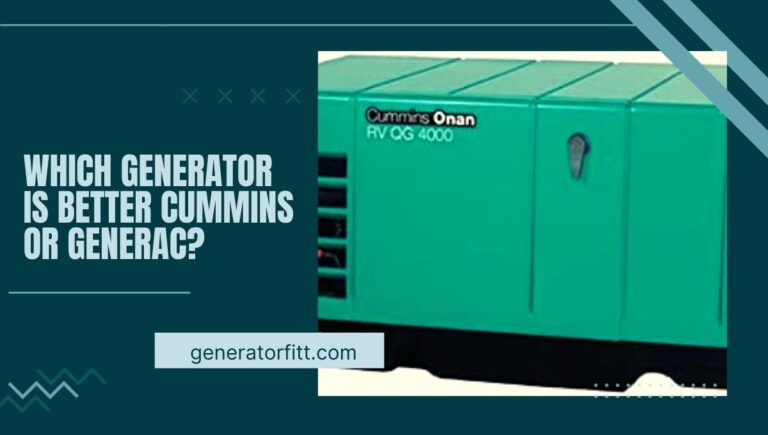What Size Generator do I Need to Run a Refrigerator?
What Size Generator do I Need to Run a Refrigerator? When it comes to emergency situations or living off the grid, having a generator can be a lifesaver.
But choosing the right size generator to power your appliances is crucial. In this article, we will focus on one of the most essential appliances in your home – the refrigerator.
We will guide you through the process of determining the size of the generator you need to keep your fridge running during power outages or when you’re away from the grid.

Why Is It Important to Choose the Right Size Generator?
Before we delve into the specifics, it’s essential to understand why choosing the right generator size matters.
Selecting an undersized generator can lead to overloaded circuits, damage to appliances, and inefficiency.
On the other hand, an oversized generator can be costly to purchase and operate. Finding the right balance is key.
Calculating Your Refrigerator’s Power Requirements
To determine the appropriate generator size for your refrigerator, you’ll need to gather some information and perform a few calculations. Let’s break it down step by step:
Step 1: Identify the Refrigerator’s Starting Wattage
Refrigerators have two power ratings: starting wattage and running wattage. The starting wattage is the initial surge of power required to kickstart the compressor. This surge can be up to three times the running wattage. You can usually find this information on a label inside the fridge or in the user manual.
Step 2: Determine the Running Wattage
The running wattage is the continuous power consumption of your refrigerator. It’s generally lower than the starting wattage. You can also find this information on the label or in the user manual.
Step 3: Calculate the Total Wattage
To calculate the total wattage required for your refrigerator, add the starting wattage and the running wattage together.
Step 4: Consider Other Appliances
If you plan to power other appliances simultaneously, like lights or a freezer, make a list of their wattages and add them to the total.
Choosing the Right Generator Size
Now that you have the total wattage requirements, you can choose the appropriate generator size. Generators are rated in watts, and you’ll want to pick one that can handle the combined wattage of your refrigerator and any additional appliances.
Example Calculation
Let’s say your refrigerator has a starting wattage of 800 watts and a running wattage of 150 watts. You also want to power a few lights, which consume 60 watts in total.
Your total wattage requirement would be 800 + 150 + 60 = 1010 watts. In this case, you would want a generator with a capacity of at least 1010 watts to ensure smooth operation.
Additional Considerations
1. Surge Capacity
Generators also have a surge or peak capacity, which is higher than their rated running capacity. Having a generator with a surge capacity slightly above your total wattage requirement can handle the initial power surge when your refrigerator starts.
2. Fuel Type
Consider the fuel type of the generator (gasoline, propane, diesel) and the availability of that fuel during emergencies or when off the grid.
3. Noise Level
If you’re concerned about noise, look for an inverter generator, which is quieter than conventional generators.
4. Portability
Think about whether you need a portable generator or a standby generator that’s permanently installed.
People also ask
How big of a generator do I need to run a full-size refrigerator?
To run a full-size refrigerator, you’ll typically need a generator with a capacity of around 800 to 1200 watts.
It’s essential to check the refrigerator’s specific power requirements, but this range should cover most standard models.
Will a 2000-watt generator run a full-size refrigerator?
Yes, a 2000-watt generator will easily run a full-size refrigerator, as it provides more than enough power to meet the refrigerator’s requirements.
How big of a generator do I need to run a fridge and TV?
To run both a refrigerator and a TV simultaneously, you’ll generally need a generator with a capacity of at least 3000 to 4000 watts.
This should provide enough power for both appliances without overloading the generator.
Can I run a refrigerator on a 1200-watt generator?
Running a refrigerator on a 1200-watt generator is possible, but it depends on the refrigerator’s power requirements.
Some smaller or energy-efficient models may work, but larger or older fridges might exceed that wattage and may not run efficiently on a 1200-watt generator. Always check the refrigerator’s specifications to be sure.
Conclusion – What Size Generator do I Need to Run a Refrigerator
In conclusion, determining the size of the generator you need to run a refrigerator depends on the refrigerator’s power consumption.
To ensure it operates safely and efficiently during power outages, you should check the appliance’s wattage requirements and select a generator with a capacity that exceeds this value.
It’s essential to match the generator’s size to the refrigerator’s needs to prevent damage and ensure reliable backup power.
Hi, I am Brines Loe and I am an Expert in Generators I have Experience in This Field I want to Help You About This Website! Welcome to our generator (Outdoor) Guide blog! We are dedicated to providing you with the latest information and tips on outdoor generators, ensuring that you have the knowledge you need to make informed decisions about which generator is right for you.






